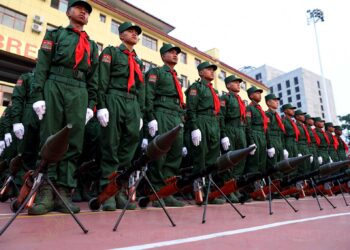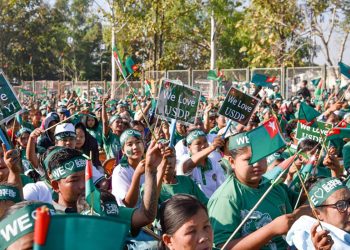NAYPYITAW—The Myanmar military (or Tatmadaw) plans to hold peace talks with ethnic armed organizations in Shan State’s Kengtung, military spokesperson Brigadier-General Zaw Min Tun told The Irrawaddy on Thursday.
“[The Tatmadaw] plans to hold more rounds of peace talks. [They] will be held in Kengtung,” the military spokesperson said. He declined to say which armed groups the Tatmadaw planned to meet.
However, speculation arose that peace talks will be held with the three ethnic armed groups—the Ta’ang National Liberation Army (TNLA), Arakan Army (AA) and Myanmar National Democratic Alliance Army (MNDAA)—that have been clashing with the Myanmar military in Shan State since Aug. 15.
The Irrawaddy was unable to contact officials from any of the three groups to confirm the speculation.
“We will go [to hold peace talks] upon receiving instructions from the higher-ups. If peace talks are to be held, [the stakeholders] need to meet as soon as possible,” U Hla Maung Shwe of the government’s Peace Commission told The Irrawaddy.
Speaking at the military’s Friday press conference, the chairman of the Tatmadaw True News Information Team, Major-General Soe Naing Oo, said, “To put it bluntly regarding those groups: Will they come to peace talks? The Tatmadaw welcomes them. Do they want to continue fighting? We are ready.”
Chinese Ambassador to Myanmar Chen Hai paid a call on Myanmar military chief Senior-General Min Aung Hlaing on Thursday and discussed holding talks between the Myanmar government, Tatmadaw and rebel groups.
According to a statement from the Office of the Commander-in-Chief, the Chinese ambassador said Beijing strongly condemned the rebel attacks. The military chief and the ambassador also discussed China’s assistance to Myanmar’s peace process, it said.
Joint forces of the TNLA, AA and MNDAA (which together with the Kachin Independence Army constitute the Northern Alliance) launched coordinated attacks on six places including the Defense Services Technology Academy in Mandalay Region’s Pyin Oo Lwin Township and Shan State’s Naung Cho on Aug. 15. The KIA has however distanced itself from the fighting.
Rebel fighters also blew up the Goke Twin Bridge in Naung Cho Township in the Aug. 15 attack, prompting area clearance operations by the Tatmadaw. The bridge formed part of the Union Highway, the major route for border trade between China and Myanmar
As China has substantial influence over the Northern Alliance, it could broker talks between them and the Myanmar military, according to Myanmar Institute of Peace and Studies director Dr. Min Zaw Oo.
“The problem for the time being is how to implement a ceasefire, rather than a political problem. To find a solution, the Tatmadaw and those groups must hold bilateral talks,” Dr. Min Zaw Oo said.
Chinese Special Envoy for Asian Affairs Sun Guoxiang summoned the Federal Political Negotiation and Consultative Committee (FPNCC) to China’s Kunming on Aug. 20 and reportedly put pressure on the political bloc to stop the fighting.
The four members of the Northern Alliance and three other ethnic armed groups constitute the FPNCC, which is led by the United Wa State Army (UWSA).
At their meeting with Sun, Northern Alliance members set the following preconditions for a ceasefire: the Tatmadaw must stop its military operations in the Rakhine, Kokang and Palaung ethnic regions; it must stop committing war crimes in all ethnic areas; and the government must broker meaningful ceasefire talks.
While the AA and TNLA are heavily reliant on the KIA and the UWSA, China has a certain amount of influence over the KIA and UWSA, political analysts said, adding that this meant peace negotiations were likely.
The government earlier proposed Mongla as a venue for talks, but the AA, TNLA and MNDAA did not reply to that proposal, government spokesperson U Zaw Htay told members of the media on Aug. 20.
You may also like these stories:
Rebels Detain 8 Alleged Myanmar Military Troops in Shan State
Venerable Myanmar EAO Leaders Plead for End to Fighting
At Talks in China, Beijing Urges Myanmar Rebel Groups to Stop Fighting
Militia Leader, Wife Dead in Alleged Rebel Attack in Northeast Myanmar

















